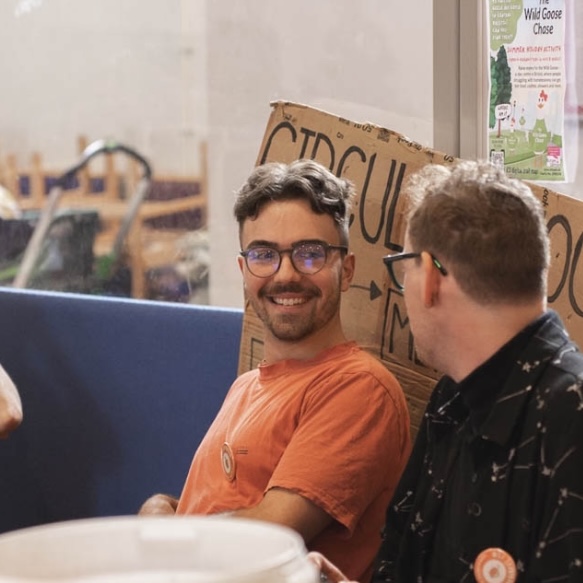From Surabaya to Bristol: What the UK Can Learn from Community Composting Success Stories
- Alex Montgomery
- Oct 25, 2025
- 4 min read
Updated: Nov 4, 2025
Rethinking Urban Waste: From Landfill to Living Soil
When people think of waste management in big cities, they often picture fleets of trucks, massive plants, and complicated technology. However, one inspiring example of food waste reduction comes from Surabaya, Indonesia. This city has shown that you don’t need expensive tech to make a real impact.
Surabaya’s story illustrates how community composting can solve urban food waste issues, restore soils, and build stronger communities. As Bristol faces similar challenges with waste, soil degradation, and local resilience, there’s much to learn from their approach.

The Surabaya Model: Less Waste, More Community
Surabaya is home to nearly 3 million residents. Like most growing cities, it once battled overflowing landfills, poor air quality, and greenhouse gas emissions. Instead of relying on centralised waste systems, the city introduced a neighbourhood composting programme. Every district received simple composting units, and residents brought their food scraps directly.
The results were remarkable:
Around 20% less organic waste going to landfill
Cleaner streets and fewer odours
Healthier soils for urban gardens
Stronger community participation
This success wasn’t driven by technology; it was driven by people, behaviour change, and local leadership.
Why Community Composting Works
Surabaya’s success was not just about reducing waste; it reshaped the relationship between citizens and their environment.
Cleaner Neighbourhoods
Fewer food scraps meant fewer pests, odours, and complaints.
Healthier Soils
Compost returned to gardens and urban farms, enriching the soil and boosting food production.
Stronger Communities
People saw the visible impact of their actions and took pride in caring for their local spaces.
Lower Costs
By reducing transport and landfill expenses, the city saved money while improving the quality of life.
Community composting proved that waste management isn’t just about disposal; it’s about circulating nutrients and regenerating local ecosystems.

Lessons for Bristol
Bristol has already taken steps to reduce food waste through Bristol Waste Company, which collects household scraps for anaerobic digestion at GENeco in Avonmouth. While that system generates renewable energy, it’s not perfect:
Anaerobic digestion prioritises energy over soil regeneration.
Contamination (plastic, metals, antibiotics) lowers digestate quality.
Centralised systems still rely on truck transport, increasing emissions.
This is where community composting can complement, not compete with, the existing model. If even 20% of Bristol’s households adopted decentralised composting as in Surabaya, we’d see:
Thousands of tonnes of organic matter kept local
Healthier urban soils for gardens, schools, and green spaces
Stronger community networks reducing isolation and promoting resilience
Why Bokashi Makes Sense for Cities
Traditional composting can be tricky in small spaces. It can smell, take months, and often requires a garden. That’s why bokashi fermentation is ideal for urban homes and flats.
✅ Smell-free thanks to beneficial lactic acid bacteria
✅ Handles more food types, including cooked food, meat, and bread
✅ Compact and fast, perfect for city living
By combining household bokashi systems with neighbourhood compost hubs, Bristol can recreate Surabaya’s success in a way that fits our local infrastructure and culture.

The Bristol Living Compost Project
This vision is already taking shape through the Bristol Living Compost Project. Our mission is to turn local food waste into living soil for community gardens and urban farms.
We’re creating a network of bokashi-powered compost hubs, where households drop off food scraps that are transformed into microbe-rich compost for local green spaces. Our goal isn’t to replace Bristol Waste Company or GENeco; it’s to work alongside them by:
Reducing contamination at the source
Improving soil health through living compost
Keeping nutrients cycling within Bristol
If you live in Bristol, you can get involved:
🧑🏫 Book a composting workshop for your street, school, or workplace
🪱 Order living compost for your garden or allotment

Final Thoughts: Building a Local Compost Revolution
If Surabaya can turn its waste crisis into a community solution, so can Bristol. We’re starting small with buckets, microbes, and neighbours. With your support, we can build a movement that restores soil, strengthens communities, and keeps Bristol’s food waste where it belongs: in the ground, not the bin.
Join the Bristol Living Compost Project today to help regenerate our city, one caddy at a time.
The Future of Urban Composting
As cities grow, the need for sustainable waste management becomes more pressing. Urban composting is not just a trend; it’s a necessity. By adopting practices like those in Surabaya, cities can transform waste into a valuable resource.
The Role of Education
Education plays a crucial role in this transformation. Workshops and community events can raise awareness about the benefits of composting. They can also teach residents how to compost effectively.
Building Partnerships
Collaboration between local governments, businesses, and community groups is essential. By working together, we can create a robust composting infrastructure that benefits everyone.
Encouraging Participation
Engaging residents in composting initiatives can foster a sense of ownership. When people feel connected to their community, they are more likely to participate in sustainability efforts.
Measuring Success
Tracking the impact of composting initiatives is vital. By measuring the amount of waste diverted from landfills, we can demonstrate the effectiveness of these programs. This data can help secure funding and support for future projects.
Conclusion: A Call to Action
The journey towards a sustainable future starts with each of us. By embracing community composting, we can make a significant difference. Let’s work together to create a cleaner, greener Bristol.
Join the movement today and be part of the solution!




Comments